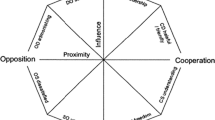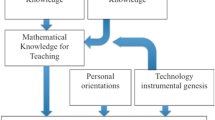Abstract
Cognitively demanding tasks have been shown to support students’ understanding of mathematics. How a task is launched, or introduced, determines how students engage with the task, as well as the type of work the teacher engages in during the task implementation. The authors designed a unit focused on launching a task where prospective teachers (PSTs) planned and enacted a task launch as part of their methods of teaching secondary mathematics courses. Participants in the study spanned three institutions. Using a curricular noticing framework, this paper describes how the prospective teachers (PSTs) interpreted their task by identifying key contextual features, mathematical relationships, and common language, and then focuses on how they responded to their interpretations as they planned to elicit and develop their students’ understanding of those key aspects. This paper also describes how the PSTs responded to their interpretations in planning to maintain the cognitive demand of the task. Findings suggest that the prospective teachers valued student-centered approaches and used a range of pedagogical methods to launch cognitively demanding tasks. We also found the prospective teachers needed support identifying context in tasks and in determining how much to tell while maintaining the cognitive demand of the task. We conclude with implications and suggestions for methods courses on both launching a cognitively demanding task and on teaching practices more generally.





Similar content being viewed by others
Notes
One task, the Toothpick Task, had limited contextual features.
The sum for instances of specific (n = 28) and non-specific (n = 11) questioning does not add to 34 instances because in some cases, PSTs plans included both specific and non-specific questioning for a particular aspect.
References
Amador, J. M., & Earnest, D. (2018). Launch forth: Preservice teachers translating elementary mathematics curriculum into lessons. Mathematics Education Research Journal, 31(3), 301–323.
Creager, M. A., Snider, R. B., Parrish, C. W. (2021). Learning to launch cognitively demanding tasks: A practicebased unit for secondary methods. Mathematics Teacher Educator, 9(2), 127–144. https://doi.org/10.5951/MTE.2019.0002
Boaler, J., & Staples, M. (2008). Creating mathematical futures through an equitable teaching approach. The case of Railside School. Teachers College Record, 110(3), 608–645.
Boston, M. D., & Smith, M. S. (2009). Transforming secondary mathematics teaching: Increasing the cognitive demands of instructional tasks used in teachers’ classrooms. Journal for Research in Mathematics Education, 40(2), 119–156.
Boston, M. D., & Smith, M. S. (2011). A ‘task-centric approach’ to professional development: Enhancing and sustaining mathematics teachers’ ability to implement cognitively challenging mathematical tasks. The International Journal on Mathematics Education, 43(6–7), 965–977.
Chapin, S., & O’Connor, C. (2007). Academically productive talk: Supporting student learning in mathematics. In W. G. Martin, M. Strutchens, & P. Elliott (Eds.), The learning of mathematics, 69th NCTM yearbook (pp. 113–128). National Council of Teachers of Mathematics.
Corbin, J., & Strauss, A. (2008). Basics of qualitative research: Techniques and procedures for developing grounded theory (3rd ed.). Sage.
Dietiker, L., Males, L. M., Amador, J. M., & Earnest, D. (2018). Curricular noticing: A framework to describe teachers’ interactions with curriculum materials. Journal for Research in Mathematics Education, 49(5), 521–532.
Doyle, W. (1983). Academic work. Review of Educational Research, 53(2), 159–199.
Faith, C., Cleverdon, J., & Parrish, C. W. (2020). Lessons learned from launching tasks. Banneker Banner, 32(1), 10–18.
González, G., & Eli, J. A. (2015). Prospective and in-service teachers’ perspectives about launching a problem. Journal of Mathematics Teacher Education, 20(2), 159–201.
Grossman, P., Compton, C., Igra, D., Ronfeldt, M., Shahan, E., & Williamson, P. (2009). Teaching practice: A cross-professional perspective. Teachers College Record, 111(9), 2055–2100.
Henningsen, M., & Stein, M. K. (1997). Mathematical tasks and student cognition: Classroom-based factors that support and inhibit high-level mathematical thinking and reasoning. Journal for Research in Mathematics Education, 28(5), 524–549.
Herbel-Eisenmann, B. A., Steele, M. D., & Cirillo, M. (2013). (Developing) teacher discourse moves: A framework for professional development. Mathematics Teacher Educator, 1(2), 181–196.
Hiebert, J., & Grouws, D. A. (2007). The effects of classroom mathematics teaching on students’ learning. In F. K. Lester (Ed.), Second handbook of research on mathematics teaching and learning (pp. 371–404). NCTM.
Jackson, K. J., Shahan, E. C., Gibbons, L. K., & Cobb, P. A. (2012). Launching complex tasks. Mathematics Teaching in the Middle School, 18(1), 24–29.
Jackson, K. J., Garrison, A., Wilson, J., Gibbons, L. K., & Shahan, E. C. (2013). Exploring relationships between setting up complex tasks and opportunities to learn in concluding whole-class discussions in middle-grades mathematics instruction. Journal for Research in Mathematics Education, 44(4), 646–682.
Jacobs, V. R., Lamb, L. L. C., & Philipp, R. A. (2010). Professional noticing of children’s mathematical thinking. Journal for Research in Mathematics Education, 41(2), 169–202.
Lobato, J., Clarke, D., & Ellis, A. (2005). Initiating and eliciting in teaching: A reformation of telling. Journal for Research in Mathematics Education, 36(2), 101–136.
Lortie, D. C. (1975). Schoolteacher: A sociological study. University of Chicago Press.
Munter, C. (2014). Developing visions of high-quality mathematics instruction. Journal for Research in Mathematics Education, 45(4), 584–635.
Nathan, M. J., & Petrosino, A. (2003). Expert blind spot among preservice teachers. American Educational Research Journal, 40(4), 905–928.
National Council of Teachers of Mathematics [NCTM]. (2014). Principles to actions: Ensuring mathematical success for all. Author.
Smith, M. S., & Stein, M. K. (2018). 5 Practices for orchestrating productive mathematics discussions (2nd ed.). The National Council of Teachers of Mathematics.
Stein, M. K., Grover, B. W., & Henningsen, M. (1996). Building student capacity for mathematical thinking and reasoning: An analysis of mathematical tasks used in reform classrooms. American Educational Research Journal, 33(2), 455–488.
Stein, M. K., & Lane, S. (1996). Instructional tasks and the development of student capacity to think and reason: An analysis of the relationship between teaching and learning in a reform mathematical project. Educational Research and Evaluation, 2(1), 50–80.
Stein, M. K., Smith, M., Henningsen, M., & Silver, E. (2000). Implementing standards-based mathematics instruction: A casebook for professional development. Teachers College Press.
Tarr, J. E., Reys, R. E., Reys, B. J., Chavez, O., Shih, J., & Osterlind, S. J. (2008). The impact of middle-grades mathematics curricula and the classroom learning environment on student achievement. Journal for Research in Mathematics Education, 39(3), 247–280.
Troki, A., Taylor, C., Starlin, T., Sztajn, P., & Heck, D. (2014/2015). Launching a discourse-rich mathematics lesson: Adapted from literacy instruction for use in mathematics, the think-aloud strategy models mathematical thinking. Teaching children mathematics, 21(5), 276–281.
Woods, D. M., & Wilhelm, A. G. (2020). Learning to launch complex tasks: How instructional visions influence the exploration of the practice. Mathematics Teacher Educator, 8(3), 105–119.
Funding
None.
Author information
Authors and Affiliations
Corresponding author
Ethics declarations
Conflict of interest
The authors declare that they have no conflict of interest.
Additional information
Publisher's Note
Springer Nature remains neutral with regard to jurisdictional claims in published maps and institutional affiliations.
Rights and permissions
About this article
Cite this article
Parrish, C.W., Snider, R.B. & Creager, M.A. Investigating how secondary prospective teachers plan to launch cognitively demanding tasks. J Math Teacher Educ 26, 395–423 (2023). https://doi.org/10.1007/s10857-022-09534-7
Accepted:
Published:
Issue Date:
DOI: https://doi.org/10.1007/s10857-022-09534-7




